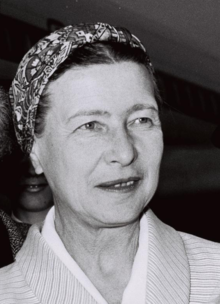
Socialist feminists
Socialist feminism rose in the 1960s and 1970s as an offshoot of the feminist movement and New Left that focuses upon the interconnectivity of the patriarchy and capitalism. However, the ways in which women's private, domestic, and public roles in society has been conceptualized, or thought about, can be traced back to Mary Wollstonecraft's A Vindication of the Rights of Woman (1792) and William Thompson's utopian socialist work in the 1800s.
3 episodes
Episodes in this category also belong to the following categories:
Lenin
Melvyn Bragg investigates what drove the Soviet leader Lenin, and enabled him to develop a model to export communism and build an original political system that remained intact for over seventy years.
16 March 2000
Featuring: Robert Service, Vitali Vitaliev
PhilosophySocialist feminists20th-century atheists20th-century pseudonymous writersNobility from the Russian EmpireRussian atheistsMarxist theoristsEmigrants from the Russian Empire to Germany, Political party founders19th-century atheistsCritics of religionsAtheist philosophersRussian male journalists19th-century pseudonymous writersAnti-nationalistsPolitical philosophersVladimir Lenin19th-century philosophers from the Russian Empire, 20th-century Russian philosophers, Emigrants from the Russian Empire to Switzerland, Emigrants from the Russian Empire to the United Kingdom, Russian communists, Russian revolutionariesAnti-monarchistsAnti-imperialistsLeaders who took power by coupMarx
Melvyn Bragg discusses Karl Marx who once said that while other philosophers wanted to interpret the world, he wanted to change it. And he changed the world with his Communist Manifesto.
14 July 2005
Featuring: A. C. Grayling, Francis Wheen, Gareth Stedman Jones
PhilosophyEpistemologistsCritics of political economySocialist feministsHumboldt University of Berlin alumniMaterialistsUniversity of Jena alumniGerman political philosophersGerman anti-capitalists, German socialist feminists, Jewish communistsFellows of the Royal Society of Arts19th-century German philosophersTheorists on Western civilizationStateless peoplePamphleteersMarxist theoristsPhilosophers of lawCritics of work and the work ethicSocial philosophersPhilosophers of technologyMembers of the International Workingmen's AssociationPhilosophers of economicsWriters about religion and scienceWriters about globalizationUniversity of Bonn alumniPhilosophers of culturePhilosophers of educationPhilosophical anthropologyGerman revolutionariesAnti-consumerists19th-century atheistsCritics of religionsAtheist philosophersCritics of JudaismEconomic historians, German sociologistsOntologistsPhilosophers of mindJewish socialistsMetaphysiciansGerman writers on atheismAnti-nationalistsGerman Marxist writersPhilosophers of religionBurials at Highgate CemeteryWriters about activism and social change19th-century German historiansPhilosophers of sciencePhilosophers of historyGerman male non-fiction writersAnti-imperialistsSimone de Beauvoir
Melvyn Bragg and guests discuss Simone de Beauvoir - her work on existentialist ethics, philosophy and literature and her influence on feminism.
22 October 2015
Featuring: Christina Howells, Margaret Atack, Ursula Tidd
PhilosophySocialist feministsFrench communistsFrench philosophers of artFeminist theoristsExistentialistsFrench feministsBisexual women writersPhilosophers of sexuality20th-century French memoiristsFrench bisexual women, French bisexual writersFrench atheistsBurials at Montparnasse Cemetery20th-century French novelistsFormer Roman CatholicsFeminist studies scholarsJerusalem Prize recipientsFrench philosophers of educationFrench political philosophersCommunist women writersBisexual memoiristsDeaths from pneumonia in France, Prix Goncourt winnersFrench women philosophersFrench Marxists, French anti-war activistsFrench literary criticsAtheist philosophersBisexual novelistsFrench women novelists20th-century French philosophers20th-century French women writersFrench LGBTQ novelistsWriters from ParisUniversity of Paris alumniScholars of feminist philosophy


